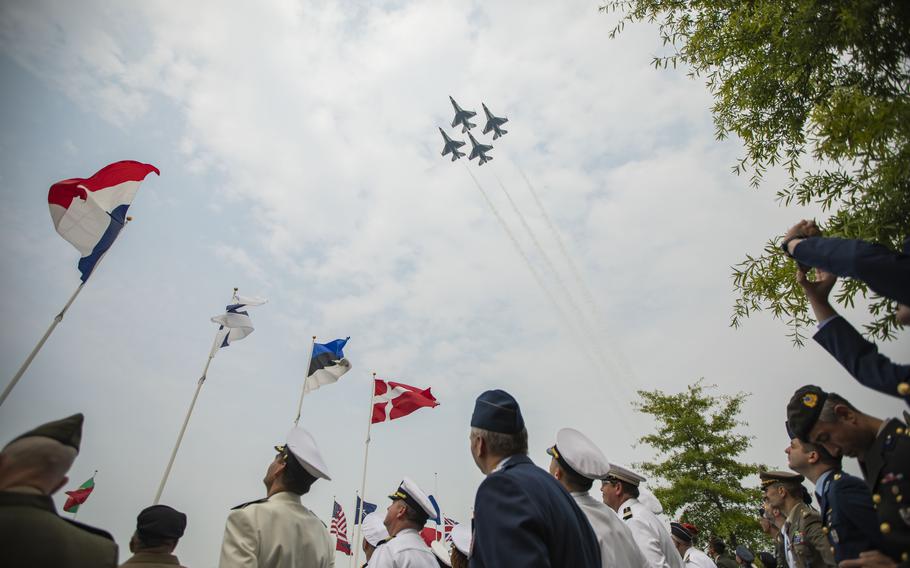
NATO officials watch as the U.S. Air Force Thunderbirds fly over in celebration of NATO’s Norfolk headquarters’ 20th anniversary June 7, 2023 in Norfolk, Va. Leadership showcased the Allied Command Transformation’s work with an exhibit honoring its history before a ceremonial flag raising. (Tess Crowley/The Virginian-Pilot)
(Tribune News Service) — Dignitaries and senior military leadership from all 31 North Atlantic Treaty Organization nations gathered Wednesday at its Norfolk, Va., headquarters to celebrate 20 years of “meeting the challenges of today and tomorrow.”
A sea of officers — donning military dress uniforms in shades of white, black, gray, tan, green and blue — stood at attention saluting the NATO and Allied Command Transformation flags as they were hoisted. The flags of each member nation billowed in the breeze as the U.S. Air Force Thunderbirds flew overhead, signifying the start of the ceremony.
While NATO’s presence in Norfolk dates back to 1952, the Allied Command Transformation was established June 19, 2003, following a restructuring in response to the 9/11 terrorist attacks. For the past two decades, the alliance has led NATO’s development of new warfighting capabilities through scientific research, experimentation and technological development.
“Twenty years on, we are still here, still daring and still looking to tomorrow while contributing to today,” said French Air Force Gen. Philippe Lavigne, Supreme Allied Command Transformation.
The alliance invited foreign dignitaries and the media to view an exhibition of NATO’s 74-year history and the role Hampton Roads has played in its mission.
In celebrating the command’s achievements of the past two decades, senior leadership also considered the challenges of the future and spoke to the continued need for a strong NATO. Among those challenges are space and cyber domains, as well as cognitive warfare, of which the alliance has had to adapt to in recent years.
“In the summer of 2021, when NATO ended its mission in Afghanistan, we could not have predicted that by February 2022 there would be another large-scale war in Europe,” said Adm. Robert Bauer, of the Royal Netherlands Navy and chair of the NATO Military Committee. “Within a year, we have shifted from an era of crisis management operations, back to an era of collective defense.”
The Norfolk command, Bauer said, has played a crucial role in ensuring NATO’s nations are “ready to expect the unexpected” and is needed now “more than ever.”
“We would be busy fighting off the crocodiles closest to the canoe, not realizing we were heading towards a waterfall,” Bauer said of the command.
Lavigne echoed Bauer, speaking more to Russia’s ongoing war against Ukraine.
“In 2003, large-scale war in Europe was something that belonged in history books … Yet here we are in 2023, with war in Ukraine and under near constant cognitive assault … And scarier still, Russian officials talking casually about the nuclear destruction of entire cities,” Lavigne said.
Following the Russian invasion, NATO responded by strengthening forces on the eastern flank, establishing new multinational battlegroups in Bulgaria, Hungary, Romania and Slovakia, which doubled the number of troops on the ground and extended NATO’s forward presence from the Baltic Sea in the north to the Black Sea in the south.
Jay Paxton, Chief of Public Affairs for Allied Command Transformation said Wednesday that the war has galvanized unity within the alliance.
“With all allies, we kind of look at it as a family,” Paxton said. “There’s going to be different personalities in the family. What’s important is that the family sticks together … Every nation ebbs and flows on commitment, but what we are seeing is a lot of unity within the alliance — more unity, more resilience, more strength, and increased defense spending across the alliance.”
Evidence of unity against Russia was the addition of a new NATO member. Finland became the 31st NATO country in April, just under one year since the country handed in its official letter of application alongside Sweden in May 2022. Finland and Sweden’s applications to the alliance abandoned longtime policies of military nonalignment and Nordic neutrality weeks after Russia waged its war against Ukraine. Sweden’s application is pending approval from Hungary and Turkey. Unanimous approval is required.
Dep. Cmdr. Chris Badia of the Supreme Allied Command Transformation said he expects the Norfolk command’s mission — and NATO’s mission as a whole — will continue for decades to come.
“It is more important than ever,” Badai said. “You see the world is in unrest. One major aim is to create stability and make the world safer. We already are but this is a constant, evolving process and reacting to what’s going on in the world.”
However, guiding nations through the challenges of the next 20 years is NATO’s Warfighting Capstone Concept, which Cmdr. Andreas Uhl of the German Navy said acts as a “north star.” The Warfighting Capstone Concept focuses on five warfare development imperatives: cognitive superiority, layered resilience, influence and power projection, cross-domain command and integrated multi-domain defense.
“We are no longer working like a stove pipe,” said Uhl, who works in NATO’s Warfare Development fusion branch in Norfolk. “Now, we have fused everything towards this one goal. We are all proactively planning to out-think, out-excel, out-fight, out-pace, out-partner and out-last any contestant.”
©2023 The Virginian-Pilot.
Visit pilotonline.com.
Distributed by Tribune Content Agency, LLC.